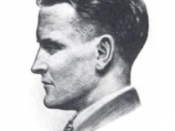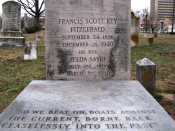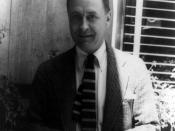Title: Such Great HeightsÃÂAspirations and Determination Help Get Us There====================While the word ÃÂgreatÃÂ is defined to be large in size, quantity, number, or importance, F. Scott Fitzgerald defines how Gatsby was ÃÂgreatÃÂ in terms of American culture, his experience, and the culture of the 1920s. The A & E Biography called F. Scott Fitzgerald the "Great American Dreamer" of the jazz age. Why the Great American Dreamer? Even though he was held to high expectations, his determination to find his dreams allowed him to capture his dreams. FitzgeraldÃÂs life experiences and tragedies helped him to create representations of his life in his novels. Coming from a family with little money, he strove to become of a higher social class by always going for the ÃÂgolden girlÃÂ. Fitzgerald had relationships with two rich girls that held him to high expectations when it came to money. He asked Ginevra to marry him, but she replied that ÃÂpoor boys donÃÂt marry rich girlsÃÂ.
Another woman named Zelda would only marry Fitzgerald after the success of his first novel This Side of Paradise. Fitzgerald defines great as an undying motivation to never lose hope on dreams and aspirations, which will enable success in the end. This was displayed in his novel The Great Gatsby, his short story ÃÂWinter DreamsÃÂ, and his A & E Biography.
FitzgeraldÃÂs motivation to attain that ÃÂgolden girlÃÂ was reflected by both Zelda and Ginevra, who were represented by Daisy from The Great Gatsby. All three were extravagant girls that desired to be with someone with wealth, and Fitzgerald would strive to become wealthy to attain that dream. In The Beautiful and Damned, Fitzgerald bases this on the dysfunctional relationship he had with Zelda. Fitzgerald not only continues to hope for more, but he becomes great with his ultimate desire.


